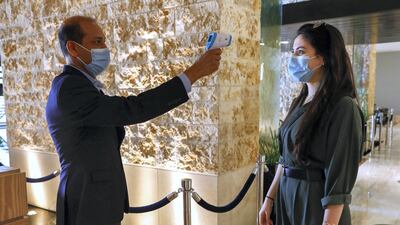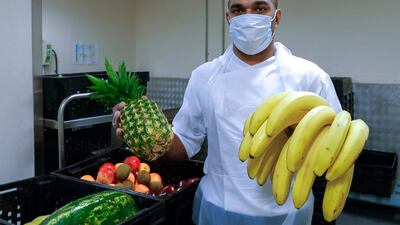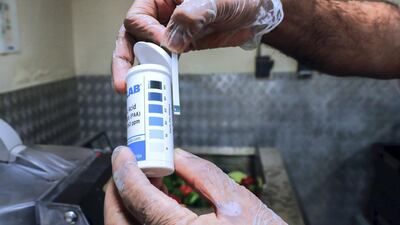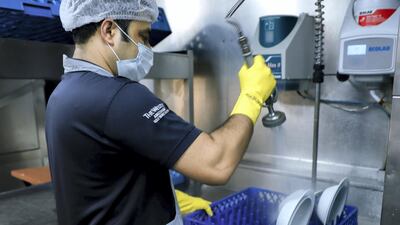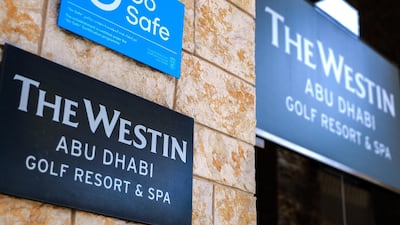Safety comes first for Abu Dhabi's 167 hotels which have all received the official seal of approval for their efforts to put guests at ease during the Covid-19 pandemic.
Abu Dhabi's Department of Culture and Tourism launched a Go Safe certificate in June to provide a benchmark for good practice and high levels of hygiene to help boost customer confidence during uncertain times.
Participation in the programme was optional, but in less than two months every hotel operating in the emirate has secured the certificate.
One such establishment seeking to provide the perfect stay for guests - many of whom still prefer to holiday at home rather than travel abroad even as flight restrictions are lifted - is The Westin Abu Dhabi Golf Resort and Spa.
From testing the temperature of all staff every three hours to washing fruits and vegetables in sanitising chemicals, nothing is left to chance at the five-star property.
In order to receive the Go Safe certification, the hotel had to abide by more than 300 safety regulations set by the authority.
Such measures cover all aspects of hotel activities, starting from when the guest arrives to check-in to making sure everything in the hotel is cleaned and sanitised before and after use.
After a guest checks out, the room is cleaned and sanitised inside-out, and sealed as ready for the next guest.
“After a check-out we have a person sanitising the furniture and steaming everything that can be steamed,” said Richa Vaz, executive housekeeper.
Everything is stripped off the bed for instance, including the mattress protector, duvet and pillow protector.
“In normal cleaning we don’t do this,” she said.
As for objects that cannot be steamed - such as the marble table surface and leather, they are wiped and sanitised with a chemical manually.
Regulations at the pool side are equally thorough – tanning beds have been distinguished with red and green signs that indicate which have been sanitised already after use, and which have not.
“Guests must also wear face masks all the time, except when inside the pool,” said Gabriela Gorda, rooms operations manager.
A long list of precautionary measures is on display at the pool entrance.
In addition to regular guidelines such as limiting the number of guests allowed in the pool area at a certain time, and making it mandatory for guests to bring their own towels, visitors must avoid socialising with others and physical contact is prohibited when in the pool.
Guests must also pass through thermal scanners before they enter the pool area.
Meanwhile, all staff on duty must return every three hours to the security gate to have their body temperature checked.
Further down at the kitchen, a sanitising factory is in motion.

Plates are placed on a conveyor belt to pass through a dishwasher that rinses, cleanses and disinfects each item.
“The machine maintains a final temperature of 72 degrees. This is why we are allowed to use normal [non-disposable] plates and cutlery,” said Debrup Mitra, senior food and beverage operations manager.
Any package that arrives to the hotel is received at a de-boxing room, where an agent “checks everything”.
“He records the expiry date, makes sure the box has not been tampered with, inspects the quality of the items, temperature and so on,” said Mr Mitra.
Next to the de-boxing room, is the sanitising room.
“We pre-wash the fruits and vegetables, remove the mud and sand, and then place it in chemical water for sanitising,” said Upul Jayasundra, junior sous chef.
He demonstrated how staff use a colour-testing strip to ascertain the chemical level in the water.
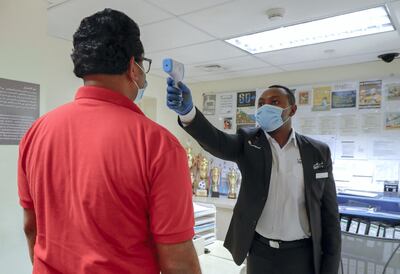
The paper must come out of the water coloured between denim blue and dark ash blue, to indicate the chemical is between 60 and 80 ppm (parts of the chemical per million), he said.
The Westin Abu Dhabi received its Go Safe certification in mid-July.
“It was a long journey,” said Fatma Kurt, PR and marketing manager.
“We had to prepare all the requirements which are under Go Safe, and the hotel’s entire team was involved in the certification programme.
The hotel was already applying most of the guidelines as part of standard Covid-19 precautionary measures.
“But it was useful for us to be certified under Go Safe in order to serve our guests in a better way,” she said.
The safety programme also included major attractions, such as the Louvre Abu Dhabi, which was among the first venues to be certified.
Qasr Al Hosn and the Cultural Foundation have also obtained Go Safe certification.
Stringent measures for venues to adhere to include social distancing, checkpoints for temperature screenings, regular disinfection of all operational areas and Covid-19 testing for employees.
“In a short amount of time, Go Safe has successfully become the benchmark for hygiene and safety levels in Abu Dhabi,” said Ali Al Shaiba, executive director of tourism and marketing, at DCT Abu Dhabi.
“Go Safe was created with our consumers’ concerns in mind, to help boost their trust and confidence and allow them to experience the best of Abu Dhabi all whilst feeling safe and reassured.”




